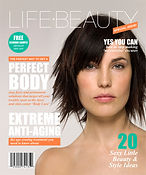Do you find yourself constantly thinking about food, calories and/or exercise? Are you highly critical of your body, especially when you compare yourself to others? Are you convinced that life would be better if you were thinner and fitter?
Perhaps you’re fixated on healthy eating or caloric restriction, and you dedicate a great deal of time and energy analyzing what you’re “supposed” to eat. For example, you might have strict rules about “good” food and “bad” food. When you exceed your caloric limit or eat “bad” food, you might decide that you’ve “failed” for the day and continue eating more than you really want to, promising yourself that you’ll start again tomorrow. Despite your best intentions, you may feel trapped in a hopeless cycle of starving, binging, self-criticism and regret.
Whether or not you’ve been diagnosed with one of many types of eating disorders—such as anorexia, orthorexia or bulimia—you might be exhausted by the hold food has on your life. Perhaps your emotions are tightly bound to your diet, weight and appearance. For you, food is more than just food—it’s release and shame, pleasure and guilt, anger and defeat. Each day is defined by the number that appears on the scale or by the sight of your reflection.
Maybe it’s difficult to believe that you have worth or that anyone could respect or love you as you are. Even when others mistreat you, you may blame yourself, certain that you don’t deserve better until you reach the perfect weight.
Are you tired of overwhelming self-hate, but wonder if changing your relationship with food is possible? Do you wish you could find a way to feel good in your body and enjoy life?
There are so many messages that say the way we look defines our worth as a person.
Disordered Eating Is Very Common
If you have an unhealthy relationship with food and your body, you are far from alone. In our image-obsessed society, many people struggle with diet-related shame, blame and guilt.
In fact, in many ways, emotional eating is built into our culture. Traditions often link food with a sense of happiness and belonging. For example, you might celebrate a birthday with cake, or spend the holidays moving from family feast to family feast.
You’re probably surrounded by messages that equate food with emotional comfort. For example, maybe your earliest caregivers offered you a cookie to soothe a tantrum. Among adults, emotional eating is so common it’s a stereotype—pints of ice cream for heartbreak, candy bars for anger, pizza and fries for stress. Unfortunately, these norms don’t teach you how to cope with emotions; they teach how to bury them, as though they are shameful.
When the relationship between food and emotions is so tangled up in shame, it’s common to believe that what you eat reflects your moral character. Like so many others, you might think that eating “bad” food or having a “bad” body means that you have failed as a person. You might even use food as a form of self-punishment or social defiance.
Although countless people struggle with disordered eating and poor body image, these issues are especially common in the LGBTQ+ community. Despite this fact, it can be difficult to find LGBTQ-affirming care. For example, there are many LGBT individuals struggling with anorexia, bulimia, over-exercise, bingeing and over eating but far too few resources dedicated to LGBT eating disorder recovery, especially for gay men with eating disorders.
Thankfully, no matter who you are, if you are longing for a better relationship with food, there is hope and help. As a gay male therapist who specializes in disordered eating, I can help you can better understand the emotions driving your diet and help you make healthy, lasting changes within both the LGBT cultural context and the larger society.
Eating Disorder Counseling
Can Help You Heal
Therapy can help you recognize and address the core emotions underlying your damaged relationship with food. Rather than focusing on what you eat, we can carefully explore the emotional reasons and patterns that drive how you eat. Then, you can start understanding that critical voice in your head and what it is attempting to do for you, so you can live with greater confidence, self-compassion and freedom.
I understand how difficult overcoming disordered eating can be, especially if you’ve been engaging with eating disordered thoughts and behaviors for a long time. I won’t push you to transform overnight, and you will never be shamed or blamed for your emotions. Instead, with humor and insight, I can guide you toward increased self-awareness, honesty, resilience, recovery and compassion.
Working together, we will examine your critical self-talk and learn to understand how come you’re so hard on yourself. For example, we might notice how you worry about your weight when you’re overwhelmed with work. Or, we might discuss past traumas that eroded your sense of self-worth and led you to believe that your appearance defines you.
Regardless of your particular concerns, once you recognize the factors driving your emotional eating, you can begin changing your relationship with food. You can come to accept that your feelings and experiences are valid, and learn new, healthier ways of coping with distress. Most importantly, you can start to believe that you do deserve kindness—from others, and from yourself.
No matter how impossible eating disorder recovery might seem right now, I know that you can make real, lasting changes. After all, just by coming to this page, you’ve offered yourself hope for something better. You’ve taken your first step toward a more peaceful, empowered life.
You may have questions or concerns about working with an eating disorder psychotherapist…
The problem isn’t my emotions—it’s my body. What I need is a trainer, nutritionist and a doctor.
If you’ve micromanaged your body for a long time, you may be convinced that’s the root problem. In truth, your emotional, mental and physical wellbeing are intricately woven together. Meaning, how you feel impacts how you behave. So, if you want to end your unhealthy relationship with food, you need to address the emotional aspects, in addition to the physical ones.
To facilitate your healing and recovery, I collaborate with dietitians and doctors who specialize in the physical features of eating disorder treatment. My role is to help you implement their recommendations by providing emotional support that helps to you become aware when disordered eating behaviors and thoughts are being used to manage your emotions and identify and integrate helpful alternatives.
I’m too embarrassed to try eating disorder counseling. Shouldn't I be able get it together on my own?
You might know that you can’t go on like this, constantly criticizing yourself, but simultaneously believe you aren’t allowed to eat “the wrong foods” in “the wrong way.” Part of you might want to accept your body, while another part swears your body is unacceptable. I can help you learn to understand your various and seemingly conflicting parts of yourself.
These confusing thoughts can be difficult to overcome. There is nothing wrong with seeking help. I am an objective, skilled expert who truly enjoys helping you change problematic beliefs and behaviors by examining how these beliefs and behaviors developed and to create new helpful and healthy ones. Through counseling, you can see yourself with greater clarity and begin to live your life to your fullest potential.
I don’t know how to have a healthy relationship with food, and I’m afraid of what will happen if I try to change.
Disordered eating thoughts and behaviors are often coping mechanisms for distressing thoughts and feelings about the past, current or the future that have gotten out of hand. You might count calories to keep your mind busy or go to the gym twice a day, only to hear your trainer tell you how disappointed they are in your lack of progress. The cycle is endless and leaves you no time or energy to feel emotions. You might binge eat to feel numb.
Unfortunately, these coping skills are like a moat around a castle. Yes, they keep out the bad, but they also keep out the good. But don’t feel ashamed. If you were never taught how to relieve stress, either in school or by your caregivers, it’s no wonder you’ve fallen into unhealthy patterns.
I can help you develop new, healthier coping options and strengthen your emotional regulation capacity. With expert guidance, you can stop escaping and start pursuing the passions, relationships and happiness you want and deserve.
Recovery from an eating disorder is possible.
You Deserve Health and Happiness!an eating disorder is possible.
You do not have to suffer and be alone and have food control your life. With my help, you can believe that you are worthy and learn to accept who you are.





